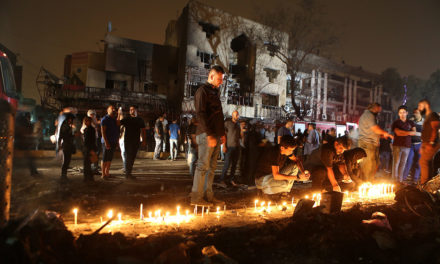On 3 January, Saudi Arabia announced it would re-open its embassy in Baghdad “at the earliest opportunity” before dispatching foreign ministry officials to Iraq the following day to initiate the process. The move marks a milestone in thawing of Iraqi-Saudi relations, which began following the formation of Iraq’s national unity government in September last year, and Saudi Arabia’s decision to join the International Coalition against Daesh.
Iraq’s first high-level diplomatic contact came in September when Foreign Minister Ibrahim al-Jaafari attended an anti-Daesh summit in Riyadh. The meeting preceded an encounter between Prime Minister Abadi and Saudi foreign minister Turki al-Faisal on the sidelines of a US-sponsored anti-Daesh conference in Brussels in November, where al-Faisal reasserted his country’s intention to re-open the embassy “soon”.
Saudi Arabia’s rhetoric towards both the Iraqi government and its condemnation of Daesh’s atrocities in Iraq has seen a marked improvement since Abadi was elected prime minister. On 19 June 2013, just ten days after Mosul fell to Daesh, the Saudi ambassador to the United Kingdom published an op-ed in the Daily Telegraph, where he impassionedly urged the international community not to respond to Iraq’s request for military assistance to defend itself from the onslaught of Daesh.
“We oppose all foreign intervention and interference,” argued Prince Mohammed bin Nawaf Al Saud. “There must be no meddling in Iraq’s internal affairs, not by us or by the US, the UK or by any other government. This is Iraq’s problem and they must sort it out themselves.”
While he categorically denied his government’s support to terrorist groups, he described Daesh as “rebels” and Iraq’s request for US airstrikes as “madness” and “beyond our comprehension”.
Fast-forward three months and the rhetoric is very different. But the prospect of seeing words being translated into meaningful action remains a slim prospect.
Saudi Arabia has pledged to crack down on extremist groups within the Kingdom, but it is unclear how effective that has been. A leaked 2009 cable by Secretary of State Hilary Clinton illustrated the extent of the problem:
“It has been an ongoing challenge to persuade Saudi officials to treat terrorist financing emanating from Saudi Arabia as a strategic priority,” she wrote. “Donors in Saudi Arabia constitute the most significant source of funding to Sunni terrorist groups worldwide.”
Furthermore, Saudi Arabian nationals have been primary contributors of death and destruction in Iraq since Al-Qaeda’s insurgency began. A US Army raid on a terror cell in Sinjar in October 2007 found records suggesting that out of a sample of 595 foreign fighters, some 244 were Saudi nationals. Even after the fall of Mosul last year, at least 42 suicide bombers have been identified as Saudis.
With no diplomatic representation in Baghdad for 25 years, Saudi Arabia has sought to exert influence over the political process from a distance since 2003. Its financial support for Sunni Arab tribes and prominent Sunni politicians is well known. It has spent millions over the years bankrolling election campaigns and supporting insurgent groups, in an attempt to shift the balance of power in Baghdad.
The oft-debated question of whether the Saudi regime has directly supported Daesh, or whether private Saudi individuals are solely to blame, is rather irrelevant. The fact of the matter is that there is no clear line between the public and private spheres in Saudi Arabia. What is clear, however, is that an autocratic regime is able to crack down on any individuals or organizations that are not in line with what it sees as its national interest.
An ISIS supporter in open display at the Hajj pilgrimage in Mecca
A quick glance at the plight of Saudi Arabia’s Shia citizenry is sufficient — denied even the right to hold peaceful protests, and sentenced to jail terms for criticizing the regime. Authorities could have chosen to exercise some muscle against clerics who openly insight violence and encourage people to fight in Iraq and Syria.
So what does the Kingdom need to do in order to prove that it is genuine about supporting security and stability in Iraq? Firstly, authorities need to show that they are serious about diffusing sectarian tensions by clamping down on hate-spewing clerics and preachers and denying them prominent platforms to spread their poisonous messages.
Secondly, it is time for authorities to name and shame individuals and organizations that are funding terrorism in Iraq, Syria and around the world. Only effective and transparent law enforcement will convince Iraqis that their neighbour is taking real steps to cut off the flow of funding to those who seek to harm them.
Finally, Saudi Arabia needs to end its financial support to Sunni tribes and politicians. Much like Iran’s attempts to coopt Shia entities, foreign attempts to interfere in Iraq’s domestic affairs are counterproductive and serve only to pit Iraqi factions against each other in a perpetual struggle. The Saudis would do well to heed this piece of advice:
“Any government that meddles in Iraq’s affairs runs the risk of escalating the situation, creating greater mistrust between the people of Iraq – both Sunni and Shia.”
These are the words of Saudi’s ambassador to the UK, from the very same June 2014 op-ed.
Saudi Arabia’s diplomatic representation in Baghdad will provide much-needed exposure for Saudi officials to realities in Iraq. For the Kingdom to decide whether it wants to be a genuine ally to Iraq, or to remain a thorn in the country’s pursuit of peace and stability, it first needs to accept the post-2003 realities in Iraq at a fundamental level. In stark terms, that means an open, pluralistic, multi-sectarian society where Shias are a majoritarian political force with Iraq’s Sunni Arabs enjoying equal citizenship as a minority sect.
The impending succession of Crown Prince Salman to the throne will present the Kingdom and its embassy in Baghdad with a historic opportunity to mend its turbulent relationship with Iraq. But don’t hold your breath.









